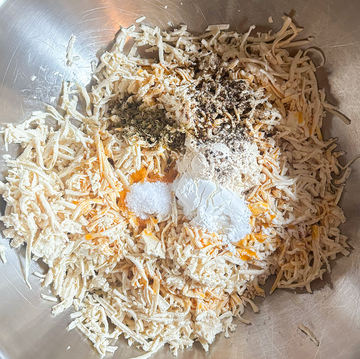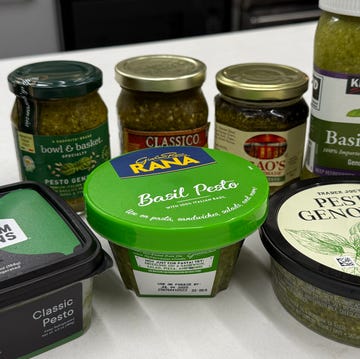Whether you're pouring a glass at home after a long day or celebrating a special occasion, there are plenty of reasons to enjoy a glass of wine. Much of what goes into your glass boils down to the grapes themselves, including the specific variety and where they're grown. Aside from Chardonnay and Merlot grapes, there's another way to categorize wine that can apply to any varietal on earth: organic.
You're probably familiar with organic eggs and produce, but the designation can also be used on wine labels. It's a small part of the world of natural wine, which has grown from a niche category to a massive consumer trend. The words organic and natural often suggest that a product is better for you than conventional alternatives. But is organic wine actually healthy? We consulted wine experts and food scientists to break down everything you need to know.
What Is Organic Wine?
The word "organic" carries a lot of weight. Therefore, food products need to abide by specific regulations to earn that title. This process can get especially complicated with wine. "There are two primary labeling categories for organic wine in the United States: Wine Made with Organic Grapes and Certified Organic Wine," says Katherine Janowiak, an advanced sommelier at Jamie's Bottle Shop.
"Wine Made with Organic Grapes is produced using grapes that are grown without the use of synthetic pesticides, fertilizers, or herbicides, relying on natural alternatives for cultivation," she says. "On the other hand, Certified Organic Wine is made using certified organic grapes, and all ingredients used in the winemaking process must also be organic—this includes items like yeast and egg whites (for fining purposes). Unlike wine made with organic grapes, no added sulfur is allowed in certified organic wine, although sulfites are naturally produced during fermentation."
The former designation doesn't qualify as USDA Organic, while Certified Organic Wine does. Vineyards that use this classification are subject to extensive oversight and regular audits. And to make things even more complicated, organic wines made in other parts of the world (like in the E.U.) are subject to different regulations, which means that international vineyards tend to rely on other verbiage to classify their products.
The first is biodynamic wine, which means that organic agricultural methods are used alongside holistic practices to treat the vineyard as a self-sustaining ecosystem. Demeter International, a global nonprofit agricultural association, regulates these wines.
There's also the term "natural," but like other food labels, it doesn't necessarily mean much. "It typically means native yeast fermentation, no additives, no fining or filtering, and little to no added sulfur. These wines often have a raw, unpolished character and can vary wildly from bottle to bottle," says Megumi Calver, certified sommelier and founder of Merobebe. "Since there’s no legal definition, natural wine labeling can be murky. Just because a bottle looks 'eco-conscious' or says it’s 'clean' doesn’t mean it was made with natural methods."
How Is Organic Wine Different From Conventional Wine?
What constitutes organic wine is highly nuanced, which means that the production process will look different depending on the vineyard.
Both Certified Organic Wine and Wine Made with Organic Grapes employ organic farming techniques to harvest their grapes. "In organic viniculture, growers avoid synthetic chemical inputs and instead use cover crops, compost, and natural pest control to maintain vineyard health," says Eric Hemer, senior vice president and director of wine education at Southern Glazer's Wine & Spirits. This process is much more labor-intensive, but it helps retain the natural flavor of the environment (a term known as terroir).
This process is also better for the overall health of the crops. "Without the artificial safety net that using additives can provide, winemakers must take care and be mindful of what is going into the soil that their grapes are grown in. The result, though, is vines and grapes that are better suited to surviving on their own versus being dependent on chemicals in the vineyard," says Torrey Grant, a sommelier at Leonetta and professor of wine appreciation at Syracuse University.
Some (but not all) vineyards will also engage in organic winemaking, which differs from the usual industrial winemaking process. The latter tends to rely on numerous additives to improve their product for store shelves. "Conventional wines have over 70 approved additives—fake oak powder, tannin powder, coloring agents like the famous Mega Purple," says Walter Hamlin, director of purchasing at First Bottle Wines. "Additional sulfites (which are not bad!) are commonly used, sometimes too much, to stabilize wines. Lastly, [they use] lab-grown yeasts for stability and processing aids like gelatin."
By contrast, organic winemakers operate under a low- or no-intervention philosophy. Instead of using commercial lab-cultured yeast, organic wine is fermented using the natural yeast present in the air and on the surface of the grapes (think of it like using sourdough starter instead of a packet of yeast when baking bread). Winemakers also avoid using synthetic fining agents for clarification, instead opting for natural sources like egg whites or pea proteins. Furthermore, Certified Organic Wine made in the U.S. does not contain sulfur, which is allowed in limited quantities in European organic wine.
Is Organic Wine Better For You?
The lack of synthetic ingredients and excessive additives certainly sounds promising. But that doesn't mean that you should rely on organic wine as a health food. It is, however, still worth trying—just not for the nutritional benefits.
"Organic wines may contain fewer synthetic residues, no GMOs, and often lower sulfite levels compared to conventional wines," Hemer says. The people most likely to notice that difference are those who are sensitive to sulfites and additives. Some proponents argue that they feel less groggy and have fewer hangovers when drinking low-intervention wine—but more research is needed to substantiate these claims.
"It could be safely assumed that those organic wines made without any of these chemicals are healthier over the long term, since wine grapes are not washed before crushing, which means that any chemical residues present would likely end up in the wine," says Dr. Bryan Quoc Le, food scientist and author of 150 Food Science Questions Answered. That being said, Le notes that naturally-sourced pesticides and herbicides aren't necessarily guaranteed to be safer than synthetically-derived ones.
And, aside from all of the additives, we have to address the elephant in the room: the alcohol. All wine, organic or otherwise, contains alcohol, which is categorized as a carcinogen. An advisory released earlier this year by the U.S. Surgeon General identified a substantial correlation between alcohol consumption and several types of cancer. "While drinking organic wine may reduce exposure to certain chemicals, it doesn’t make the wine inherently 'healthy,'" Hemer says.
Are we telling you to stop drinking? No. Wine can still absolutely play a part in an overall healthy diet, as long as you keep the risks in mind. And while an organic designation doesn't suddenly turn wine into a superfood, it does come with its perks.
"The benefits are more aligned with sustainability and personal preference than with measurable health impacts," Hemer says.
For one, low intervention allows for the flavor of the grapes to truly shine. The resulting flavor is often more complex and interesting than what you'd get from an industrially produced conventional wine. And what's arguably more important is that organic farming practices are far kinder to the environment.
















